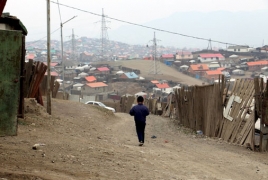Thousands risk homelessness, forced eviction in Mongolia - Amnesty December 7, 2016 - 13:02 AMT PanARMENIAN.Net - The Mongolian authorities’ are failing residents of Ulaanbaatar with an urban redevelopment process that is putting thousands of people at risk of forced eviction and homelessness, Amnesty International said in a report published Wednesday, December 7. The 55-page policy briefing, Falling Short: The Right to Adequate Housing in Ulaanbaatar, Mongolia, highlights the plight of residents in Mongolia’s capital and reviews an urban redevelopment agenda that is marred by a lack of information on eviction, compensation and resettlement. “Families are living in fear that they will be left homeless as a result of urban redevelopment. The authorities are falling short in their responsibilities to protect residents’ rights,” said Nicholas Bequelin, East Asia Director at Amnesty International. “The ambitious redevelopment agenda has not been matched with the establishment of sufficient safeguards to protect against the risk of forced eviction. There is an urgent need for the authorities to put in place clear and effective guarantees to protect residents’ rights.” The current redevelopment plan for Ulaanbaatar is focused on 24 ger areas where approximately 9% of the city’s 1.3 million residents live and public housing which is deemed unsafe or structurally unsound. Ger areas combine both houses and gers (traditional round felt dwellings) and often lack basic infrastructure such as roads, access to water, sanitation and heating. They have multiplied over the past decade, as hundreds of thousands of herder families have left the steppes to settle in the outskirts of the city. These families typically find a piece of unoccupied land, put up a fence and erect their ger as they look for new ways to support their livelihood. The redevelopment agenda has the potential to transform the living conditions for many Ulaanbaatar residents, with better housing and access to services for new and old inhabitants. It could also help combat high levels of air pollution through measures such as improved land use and upgrades to heating systems and water supplies. However, the absence of clear and adequate government regulation, effective consultation and monitoring makes individuals affected by redevelopment vulnerable to a range of human rights violations, in particular the right to adequate housing. Azerbaijani authorities report that they have already resettled 3,000 people in the Nagorno-Karabakh town of Stepanakert. On June 10, Azerbaijani President of Azerbaijan Ilham Aliyev will leave for Turkey on a working visit. Azerbaijani President Ilham Aliyev arrived in Moscow on April 22 to hold talks with Russian counterpart Vladimir Putin. Authorities said a total of 192 Azerbaijani troops were killed and 511 were wounded during Azerbaijan’s offensive. Partner news |